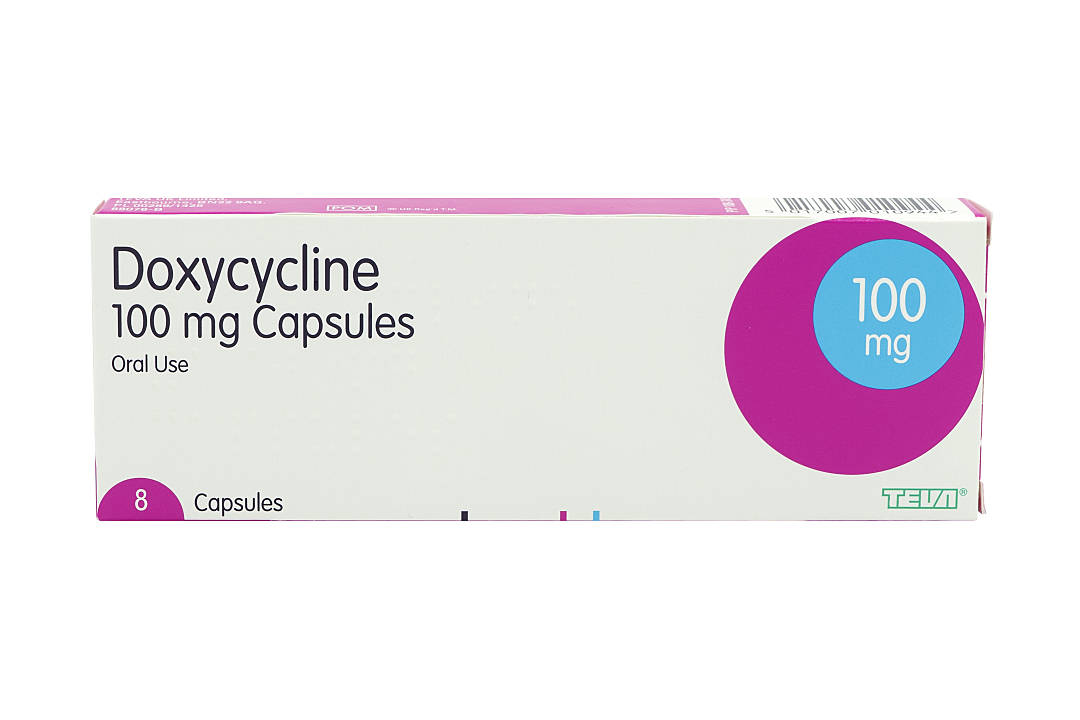Doxycycline for Chlamydia
Request doxycycline online for chlamydia with free, fast and discreet delivery
(2)



Prices from £18.00
In stock. Simply fill in a brief consultation questionnaire and one of our doctors will review your request today.
-
Chlamydia can usually be effectively treated (95% of the time) with antibiotics, like doxycycline. Doxycycline is the British Association for Sexual Health (BASHH) top recommended treatment for chlamydia.
Doxycycline for chlamydia treatment is given as one capsules twice a day for a week long course. It’s important to take each tablet with fluid or a meal and to sit up for at least 30 minutes afterwards to avoid nausea or vomiting. You should also avoid alcohol, sun exposure and sexual contact during your treatment. You can buy doxycycline antibiotics online if you or a partner have tested positive for chlamydia from our convenient online doctors service.



Doxycycline for Chlamydia
How do I take doxycycline?
Doxycyline is a 7 day antibiotic to treat chlamydia.
It's taken as one tablet twice per day for 7 days and sexual contact must be avoided until you finish the treatment. It should be taken with fluids or meals and you should sit up for 30 minutes after each tablet.
Common side effects of doxycycline
Common side effects include:
- headache
- tummy pain
- being sick (vomiting)
- indigestion
- itchy skin
- skin that burns more easily in the sun
-
-
Doxycycline belongs to a class of antibiotics called tetracyclines. It is one of the most commonly prescribed antibiotics to treat chlamydia.
It's also used to treat other sexually transmitted infections (STIs) and other infections like chest infections, skin infections, rosacea, and dental infections as well as many other rare infections. Doxycycline can also be used to prevent malaria if you’re travelling abroad.
Doxycycline may also be known by the brand name Vibramycin D.
-
-
It's an antibiotic that stops the spread of bacteria causing chlamydia by preventing them from producing the proteins they need for survival.
-
-
If doxycycline is taken correctly, there's more than a 95% chance that it will cure chlamydia. However if you are under the age of 25 a repeat chlamydia test is recommended after 3 months.
-
-
No, it does not protect or prevent you from getting chlamydia again. Doxycycline will only treat your chlamydia as a one-off occasion so it's very important to practice safe sex methods after you've been treated.
-
-
Yes, you can get doxycycline online with ZAVA, provided you are suitable for treatment. You would need to tell us how you know you need chlamydia treatment.
-
-
To place an order, fill in our brief consultation questionnaire. Our doctor will review your request and check whether chlamydia treatment is suitable for you. Once your order has been approved, we'll dispense and post your medication.
Advantages to getting treatment with ZAVA are that we offer a discreet, simple, and fast service.
We also have different delivery options to suit you, which you can choose at the checkout. Delivery options may vary depending on the pack size and dosage chosen. We also offer a free delivery service.
-
-
Doxycycline is a prescription only antibiotic. You can also get treatment from your GP or local sexual health or genito-urinary (GUM) clinic.
-
-
The only way of knowing you have chlamydia is to get tested. It's important not to leave chlamydia untreated as it can cause serious long term problems like infertility and pelvic inflammatory disease.
You'll be eligible for treatment if you've tested positive after getting tested either at home, from your GP or local GUM/sexual health clinic and your doctor has confirmed your infection. You would also be eligible if you've had unprotected sex with a partner who has a confirmed chlamydia infection.
You will not be able to get treatment if you've had unprotected sex with a partner whose STI status you're unsure of, or if only you have symptoms. In this case, you would need to get tested before you could get treatment.
You can order a home testing kit from us or get tested from:
- ZAVA's chlamydia home test kit
- your GP surgery
- a sexual health clinic
- a genitourinary clinic (GUM)
- most contraceptive or young people’s clinic
- some pharmacies
Abortion, antenatal, or gynaecology services may also offer women a chlamydia test.
Local councils also pay for free testing in men and women under the age of 25 in their area, as part of the National Chlamydia Screening Programme (NCSP). They may also locally advertise outreach testing in places such as colleges, youth clubs or military bases.
You can also order a free NHS home self-testing kit. This is available online only in certain areas from the NHS website.
-
-
Anyone male or female, who has uncomplicated genital or rectal chlamydia and has been found suitable for doxycycline treatment by a qualified doctor can take it.
-
-
You should not take doxycycline if you:
- are allergic to doxycycline or any other of its excipients or any other tetracycline
- are pregnant
- are breastfeeding
- have enamel hypoplasia – a defect in the teeth which is caused by hard enamel
- are under 12 years old
- have a sucrose or fructose intolerance
- have rare hereditary problems with glucose galactose malabsorption or sucrose-isomaltase deficiency
Speak to your doctor before taking doxycycline if you:
- are likely to be exposed to strong sunlight or ultraviolet light, for example by using a sunbed
- have liver problems or are taking medicines which affect your liver
- have severe kidney problems
- have oesophagitis – an inflamed food pipe
- have myasthenia gravis – a disease that causes unusual tiredness and weakness of muscles, particularly in the eyelid
- have porphyria – a rare disease of blood pigments
- have systemic lupus erythematosus (SLE) – a condition characterised by a rash, hair loss, fever and joint pain
Diarrhoea or are having problems with your stomach or intestines – if you develop severe or prolonged or bloody diarrhoea during or after using doxycycline tell your doctor immediately since it may be necessary to interrupt your treatment. This may be a sign of bowel inflammation (pseudomembranous colitis) that can occur with taking antibiotics.
-
-
Some medicines interact with doxycycline and should not be taken together. Speak to your doctor or pharmacist for further advice if you are taking any of the following:
- Penicillin antibiotics
- Rifamipicin – used to treat tuberculosis
- Anticoagulants such as warfarin
- Quinapril – used to treat high blood pressure
- Kaolin – used to treat diarrhoea
- Sucralfate – used to treat and prevent stomach ulcers
- Barbiturates such as phenobarbital
- Ergotamine or methysergide – used to treat migraines or headaches
- Typhoid vaccine
- Antiepileptics such as carbamazepine or phenytoin
- Ciclosporin – used to adjust the body’s immune response following organ transplants
- Methoxyflurane – an anaesthetic
- Methotrexate – used to treat psoriasis, rheumatoid arthritis or cancer
- Retinoids – used to treat various skin conditions
- Antacids (indigestion tablets or liquids) containing aluminium, calcium, magnesium or other medicines containing iron, bismuth or zinc salts, should not be taken at the same time as Doxycycline as its absorption can be reduced.
Doxycycline will not affect your ability to drive or use machines. However, if you think you feel unwell after taking the medication, do not put yourself and others at risk.
Do not drink alcohol while you're taking doxycycline, as it can increase the risk of side effects and liver problems.
-
-
Based on your chlamydia test results, your medical history and other medicines you are taking your doctor will assess if it's the right treatment for you.
-
-
Like all medicines, doxycycline can cause side effects, although not everybody gets them.
If you think you are having side effects from doxycycline, speak to your doctor or pharmacist. They'll be able to advise you on the most appropriate treatment. This might be:
- stopping your course of treatment
- suggesting an alternative antibiotic like Azithromycin
- taking an antihistamine to help ease symptoms of a mild allergic reaction
- taking a simple painkiller to help ease symptoms of a headach
- keeping well-hydrated and eating simple non-rich meals to ease symptoms of sickness or indigestion
-
-
- Inflammation and/or ulcers of the gastrointestinal tract (symptoms may include sore mouth or difficulty swallowing)
- Nausea
- Diarrhoea
- Loss of appetite
- Tinnitus – a ringing or buzzing noise in your ear
- Soreness and itching of your genitals or rectal area
- Yeast infection around your genitals or anus
If any of these uncommon side effects persist or are troublesome you should see your doctor.
-
-
If you experience any of the side effects listed below, tell your doctor as soon as possible:
- Severe skin reactions such as erythema multiforme (circular, irregular red patches), Stevens-Johnson syndrome (rash with flushing, fever, blisters or ulcers), toxic epidermal necrolysis (reddening, peeling and swelling that resembles burns)
- Sensitivity to sunlight – you can get a skin rash, itching, redness or severe sunburn when out in sunlight or after using a sun bed
- Loosening of the nail from the nail bed after exposure to the sun – this could be a reaction called photo-onycholysis
- Severe headaches, blurred and/or double vision, blind spots, permanent loss of vision
- Bulging fontanelles (soft spot on head)
- Swollen tongue, severe watery or bloody diarrhoea, fever and painful stomach cramps (pseudomembranous colitis)
- Discolouration or underdevelopment of teeth
- Low blood pressure or fainting
- Joint or muscle pain
- Heartburn
- Fast heart rate or palpitations
- Blood disorders or porphyria
- Discolouration of the thyroid tissue (does not affect thyroid function)
- Hepatitis (inflammation of the liver)
- Liver failure
-
-
Side effects which are exceptionally rare and have only been reported in a few cases include:
- pancreatitis
- jaundice (yellowing of the skin or white of the eyes)
- black hairy tongue
- drug Rash with Eosinophilia and Systemic Symptoms (DRESS) – a rare drug reaction characterised by a skin rash, fever and blood abnormalities
- Jarisch-Herxheimer reaction – this is usually self-limiting and causes fever, chills, headache, muscle pain and a skin rash. It occurs shortly after starting Doxycycline treatment.
If you notice any of the side effects above, or any changes which have occurred after treatment, inform your doctor right away. Similarly, you should not take any medicines to relieve your side effects, such as diarrhoea, without consulting your doctor first.
Very rarely, a severe allergic reaction to doxycycline can occur. If you experience any signs such as a severe rash, difficulty breathing or wheezing, swelling of the tongue, eyelids, or face, seek immediate medical attention from your nearest A&E department.
-
-
Treatment for chlamydia with doxycycline is usually a short term one-off treatment for 1 week. Some studies have shown that taking it long term has not been found to be associated with any more complications compared to taking a short course.
Some long-term side effects may include:
- discolouration or underdevelopment of your teeth
- gaining weight
- discolouration of your thyroid tissue (this does not affect thyroid function)
Please see the patient information leaflet provided with your medicine for a full list of contraindications, interactions and side effects.

Dr Clair Grainger studied at The University of Edinburgh from 2004 to 2009. She's worked in hospitals throughout Edinburgh and London before completing her GP training in North Middlesex Hospital in 2017.
Meet our doctorsLast reviewed: 09 Jan 2020
-
Kent Pharmaceuticals Ltd. (2009). Doxycyclin 100mg: patient information leaflet. [online]. EMC. Available at https://www.medicines.org.uk/emc/product/4063/smpc [accessed 27 September 2018]
-
NHS (2018). Medicine information about Doxycycline. [online]. NHS, Available at: https://www.nhs.uk/medicines/doxycycline/ [accessed 27th September 2018].
-
National Institute for Health and Care Excellence (2018). Drug guidelines of Doxycycline. [online]. NICE. Available at: https://bnf.nice.org.uk/drug/doxycycline.html#indicationsAndDoses [accessed 27th September 2018].











